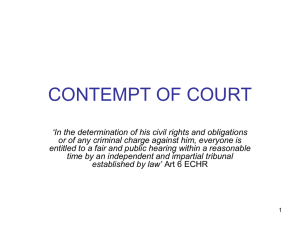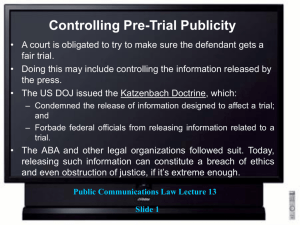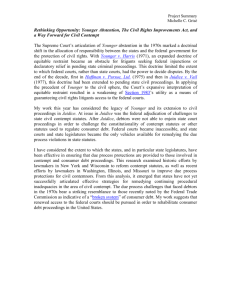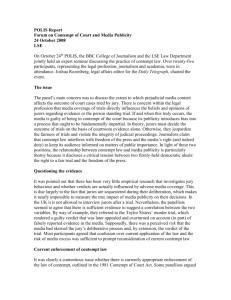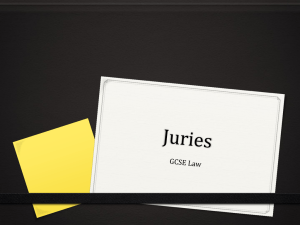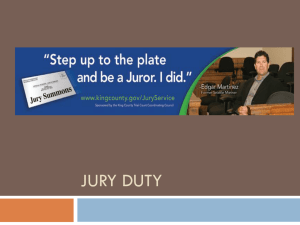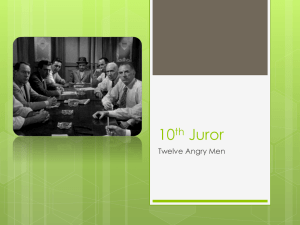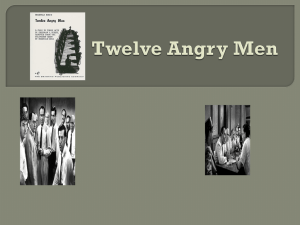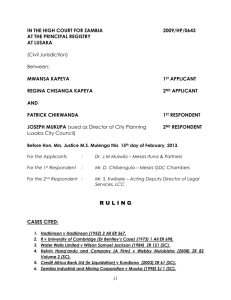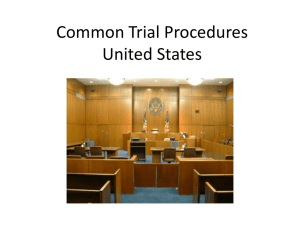The Work of the Law Commission - the Law Reform Commission of
advertisement
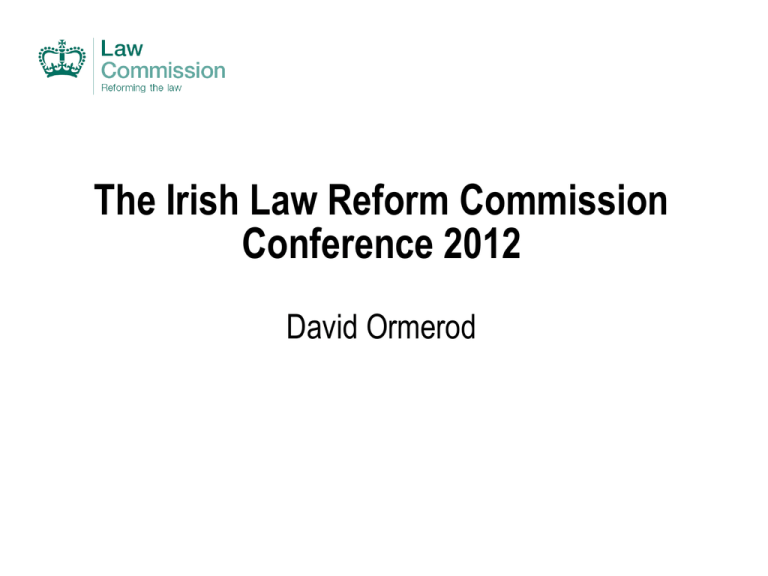
The Irish Law Reform Commission Conference 2012 David Ormerod Contempt of Court Background Reference from Crim. Proc. Rules Cttee Part of 11th Programme of Law Reform Expedited because of high profile cases in relation to publication contempt and juror contempt General concerns about the effectiveness of the law in a world of internet and modern media communications Stages of reform process Project Initiation Informal meetings with stakeholders and interested groups Identify pressing problems in practice Identify scope of project Project initiation document to be approved by Commissioners Consultation Liaise with Govt Departments and AGO Liaise with judicial college, experts Appoint and work with Advisory Board Academics Judges Practitioners Publish consultation paper Process Knowledge Accurate evidence not assumption Surveys Stakeholder fact finding meetings High quality research Comparative Interdisciplinary Comprehensive ECHR Preparing Impact Assessments and costings Thinking about solutions beyond the statute book Guidance Protocols Education and tool kits Inclusive consultation The publication Consultation Paper in hard copy and on line On line only appendices Background ECHR Overseas jurisdictions Survey work Lists of contempts Statutory material Impact assessments Summary for non-specialists Publication contempt Clarify the practical application of the law governing when proceedings are “active” Guidance on when to release arrestees’ names Active proceedings to end at verdict not sentence What may be published? “Substantial risk” Serious prejudice” “Serious impediment” Correct thresholds? Clarifying the relationship between these concepts Publication contempt Court orders Section 4(2) – order made in open court postponing publication of specified matters Proposal Order in writing following judicial college formula Emailed to central office Media organisations register with the office Orders emailed to all on the database Clear, efficient, consistent Publication contempt Trial process Presently in DC with civil procedure Concerns for citizen journalists in particular Proposal Trial by jury Or trial by judge alone in Crown Court Sanctions Currently 2 year max or fine Proposal Increase flexibility Community penalty Corporate fines based on turnover Publications and Modern Media Liability under 1981 Act turns on “publication” Includes “communication in whatever form” Facebook, SBS, Twitter, Digg, Delicious…. all within that definition “Publisher” unlikely to include “intermediaries” responsible as conduits, cachers or hosts Time of publication The problem of archived material P publishes before proceedings are active D is arrested P’s material is still available on line and poses a substantial risk of serious prejudice Is P in contempt? Modern media Proposal A power to make an order when proceedings are active: To remove a publication temporarily; That was first published before proceedings became active; The publication creates a substantial risk that the course of justice in the proceedings in question will be seriously impeded or prejudiced. Against a publisher within the meaning of the 1981 Act; Failure to comply with such an order without reasonable excuse shall be a contempt of court. Similar power where necessary to order non-publisher with sufficient control of the offending article Jurors Prohibiting research Jury DVD Jury Manager Judge’s homily JSB Bench Book R v Thompson (2010) “collective responsibility” of jurors And yet…. R v Dallas (2012) Statistics from Are Juries Fair? 12% of jurors admitted some forbidden research Juries Proposals Better education Clearer more consistent information to jurors Explain to jurors the reason for the restriction New offence? Powers to take mobile phones from jurors Facilities to store mobiles etc If new offence should it be tried on indictment or by judge alone in Crown Court? Juries Section 8 prohibition it is a contempt of court to obtain, disclose or solicit any particulars of statements made, opinions expressed, arguments advanced or votes cast by members of a jury in the course of their deliberations in any legal proceedings. Exception if juror reveals to court Problem of modern media breaches – R v Fraill (2011) Does s 8 inhibit research? Does s 8 inhibit revelation of miscarriage? Proposals Facilitate jury revelation to listed organisations: police, CCRC etc Contempt in the Face Preserve powers of judges to maintain order and respect in court Ensure alleged contemnors have safeguards against arbitrary detention Contact to third party Legal advice Bail Render the Courts’ powers more consistent for Crown Court and Magistrates’ Court. Consider application of hearsay rules Consider appropriateness of penalties available What next? Series of stakeholder events Symposium at University College London 16/1/2013 Consultation closes 28/2/2013 Analysis of responses Policy paper Instruct Parliamentary Counsel Produce Report and draft Bill by spring 2014
